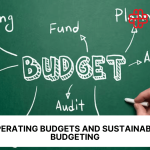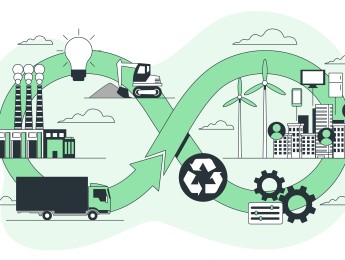One of the main things that people look for in a business, whether from the angle of a partner, supplier, or consumer, is sustainability. People will look more favourably at your business if it significantly contributes ethically or financially to socio-economic factors or benefits the wider society or local areas.
Sustainable finance means that your business contributes environmentally or socially, making you a more reputable source for purchasing and presenting a good reputation for future growth. This often means looking at your processes and perhaps portioning off a section of your profit to provide sustainable sources. You could also review your processes and switch to more sustainable methods, resources, or suppliers to contribute to wider societal change.
Environmental, Social, and Governance (ESG) investing is also viable. It involves researching resource suppliers and partnerships to invest your profits in low-risk business models that positively impact both you and others in your field.
Acknowledging and reviewing this long-term ethical vision and actively contributing to sustainable development will help you tighten your processes, increase your profit margins, and secure your future turnover and positive reputation.
Upon completion of this course, participants will be able to:
- Understand the strategic implications of financial sustainability.
- Review your processes and find more sustainable options.
- Understand the impacts of ESG on the wider environment.
- Manage complex procedures and reduce budget burn.
- Create a framework for future investments and spending.
- Understand financial terminology and insights.
- Review reporting methods and identify where changes could be made.
- Develop your communication methods, reach out to partners and share an ethical business vision.
- Future-proof your business by securing a positive reputation.
This course is designed for anyone responsible for upgrading financial processes to improve the company’s focus on sustainability. It would be most beneficial for:
- Business Owners
- Chief Financial Officers
- Financial Advisors
- Planning Managers
- Directors
- Change and Control Managers
- Data Analysts
This course uses various adult learning methods to aid full understanding and comprehension. Participants will watch videos and participate in interactive presentations to explore the benefits of considering sustainability when making financial decisions.
They will discover innovative techniques and tools to assess the company’s sustainability model and highlight pain points where processes could be improved. They will then conduct group activities to uncover the best ways to predict financial change and create a detailed financial roadmap for positive change in their organisations.
Day 5 of each course is reserved for a Q&A session, which may occur off-site. For 10-day courses, this also applies to day 10
Section 1: Your Financial Stability
- Financial systems and processes.
- Your pain points.
- Where are you losing money?
- Assessing your risk areas.
- Competitor review and analysis.
- Forecasting and worst-case scenario plotting.
- Capital steering for future growth and investment.
- The flow of capital management.
Section 2: Sustainable Finance Strategies
- The benefits of sustainable finance.
- Sustainable finance strategies.
- Communication and change management.
- Financial assessments and strategic growth models.
- SWOT analysis of financial change.
- Understanding your big-win scenarios.
- Budgeting and money-saving while maintaining quality service.
Section 3: Sustainable Solutions to Your Financial Issues
- Sustainable finance attributes.
- Key benefits of sustainability for your business.
- Reviewing your supply chain.
- Employee management and sustainable resourcing.
- IT amendments for sustainable outcomes.
- The pros and cons of automation.
- Supply chain relationship building and negotiations.
- Fundraising and working in your local area.
Section 4: Risks When Moving to a Sustainable Action Plan
- Balancing risk and return.
- Understanding the impacts of financial risk.
- Identifying your financial risks.
- Financial contingency planning.
- Developing sustainable risk mitigation procedures.
- Data analysis and requirements for change.
- Developing a positive reputation regarding sustainability to aid growth.
Section 5: Public Sector Financing
- Public vs. private sector funding.
- The role of the public sector in finance.
- Public sector business recovery.
- Sustainable financial solutions in the public sector.
Section 6: Trends & Predictions with Sustainable Finance
- Current trends and financial disruption.
- Innovation and sustainable techniques.
- Megatrends and forward-thinking processes.
- Impacts and reviewing change.
- Your financial roadmap concerning sustainability.
- How to review change processes and aim for continuous improvement.
Upon successful completion of this training course, delegates will be awarded a Holistique Training Certificate of Completion. For those who attend and complete the online training course, a Holistique Training e-Certificate will be provided.
Holistique Training Certificates are accredited by the British Assessment Council (BAC) and The CPD Certification Service (CPD), and are certified under ISO 9001, ISO 21001, and ISO 29993 standards.
CPD credits for this course are granted by our Certificates and will be reflected on the Holistique Training Certificate of Completion. In accordance with the standards of The CPD Certification Service, one CPD credit is awarded per hour of course attendance. A maximum of 50 CPD credits can be claimed for any single course we currently offer.
- Course Code MG2-140
- Course Format Classroom, Online,
- Duration 5 days














